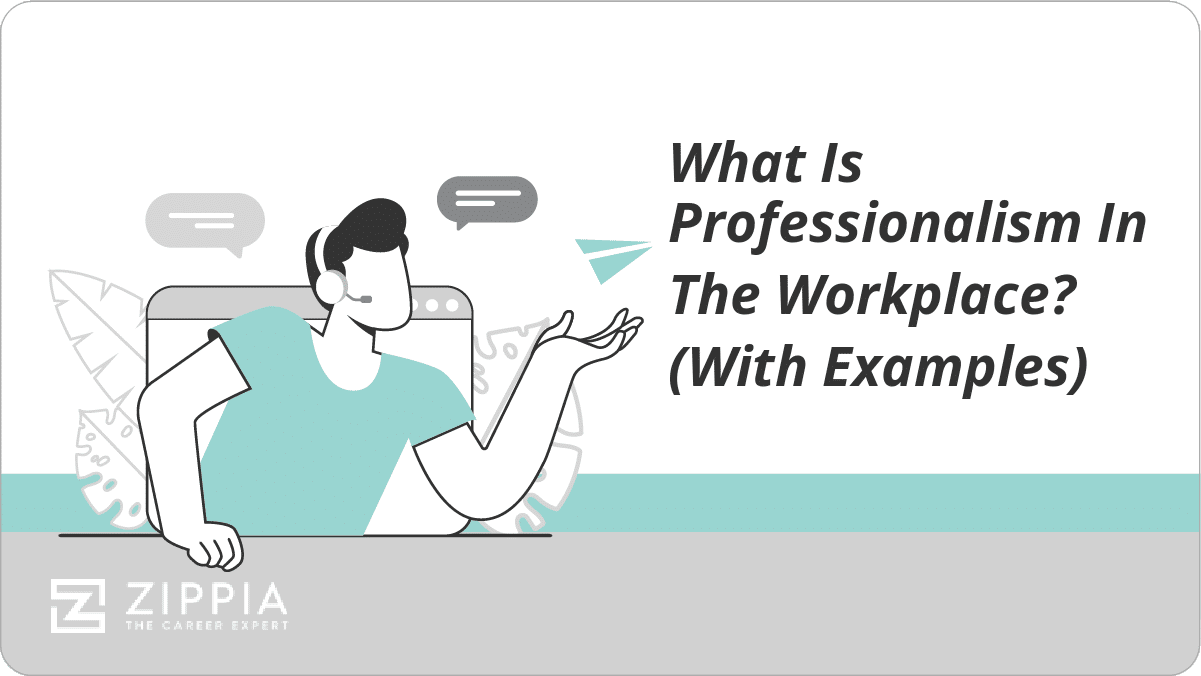- Desired Traits
- What Are Skills Employers Look For?
- What Are Inductive Reasoning?
- What Are Problem Solving Skills?
- What Are Active Listening Skills?
- What Are Management Skills?
- What Are Attention To Detail?
- What Are Detail Oriented Skills?
- What Are Domain Knowledge?
- What Is Professionalism?
- What Are Rhetorical Skills?
- What Is Integrity?
- What Are Persuasion Skills?
- How To Start A Conversation
- How To Write A Conclusion For A Research Paper
- Team Player
- Visual Learner
- Aptitude
- High Income Skills
- The Most Important Professional Skills
Find a Job You Really Want In
Whether it鈥檚 your first job or one you’ve had for a long time, it鈥檚 always helpful to know what it takes to be professional in the workplace. Have certain codes of conduct and core values that indicate your expertise and comfort in the field is an important part of career development.
A company may completely disregard your knowledge and skills if you are unable to act professionally among colleagues and clientele. Below we’ll cover what professionalism is, six characteristics of a professional, and tips for being professional in the workplace.
Key Takeaways:
-
Professionalism are the traits of a well-trained and well-adjusted employee.
-
Although professionalism is partially based on the context of the work environment, there are common characteristics found in all jobs.
-
Professionalism includes respect, competence, confidence, accountability, integrity, and etiquette.
-
To improve your professionalism live a healthy life, be an active listener, and develop your transferable skills.

- What Is Professionalism?
- 6 Characteristics of a Professional
- 11 Tips for Professionalism in the Workplace
- Why Is Professionalism Important?
- Final Thoughts
- Sign Up For More Advice and Jobs
What Is Professionalism?
Professionalism is a combination of traits, skills, behaviors, and good judgment expected from an individual well-trained and well-adjusted to their career. Professionalism also involves adhering to a set of standards that is commonly practiced among colleagues in the same workplace.
Ultimately, what constitutes professional conduct depends on the company and the culture they foster.
For example, ABC Inc. might allow client-facing staff to wear business casual clothes and arrive/leave work at flexible hours. XYZ Corp. might consider anything less than a pantsuit or jacket and tie innapropriate and hand out demerits for employees who show up three minutes late to work.
What’s considered highly unprofessional at XYZ Corp. wouldn’t cause anyone to bat an eye at ABC Inc., so learning to be professional is as much about figuring out your work environment as it is determining a foundational set of principles to follow.
6 Characteristics of a Professional
-
Respect. The most important element of professionalism is respect, for your supervisor, coworkers, subordinates, clients, and anyone else you interact wtih throughout your day. In conversation, respect means listening when someone else is speaking, showing interest through eye contact, and couching feedback in positive language.
Respect also involves empathy, as you should consider other people’s workloads before piling on requests for help or delegating additional tasks. Most importantly, remember that respect isn’t something you earn — everyone deserves respect, from the intern who grabs your coffee to the CEO who runs the show.
-
Competence. When people think of professionals, they don’t usually associate them with disorganized, unknowledge people. To be truly professional, you should strive for a deep understanding of the work you do and how it fits into the grander scheme of things.
Of course, even novices can practice professional behavior. The key to professionalism is being active and deliberate in how you improve your skills and learn new ways to contribute value to whatever projects you’re working on.
-
Confidence. While it’s wise to admit when you’re unsure of something, a professional should express certainty in most of their decisions and actions. Professionals don’t second-guess themselves on the basics or go running for help at the first sign of trouble.
They have a sense that they’ll be able to handle whatever comes up and will have an equally good sense of when a project requires help. Confidence taken too far is arrogance, so having an accurate sense of your skill set and knowledge is a big part of being professional.
-
Accountability Confidence is great, but you’re still going to make mistakes. Don’t let that shatter your self-esteem or cause you to pass the blame on others. Take ownership of your missteps and express enthusiasm to learn from them and move on.
-
Integrity. Integrity means doing the right thing, even when nobody’s watching. A true professional won’t take shortcuts just because they know they can get away with it. They give their best effort to every task set before them and can always feel proud about their day’s work.
-
Etiquette. Performing professionalism is a whole let less important than actually exhibiting it, but etiquette is still an element of professionalism. At the very least, it shows that you’re willing to abide by certain cultural norms for the general comfort of your work environment.
However, a big problem with relying on etiquette and other (somewhat) empty forms of professionalism is that these are often coded in ways that can be deconstructed as sexist, racist, or culturally biased.
Clothing and hair styles, hand gestures, speech patterns, and preferred modes/styles of communications have little to do with the actual core elements of professionalism, yet they are often unfairly cited as signs of an unprofessional individual.
11 Tips for Professionalism in the Workplace
-
Know your workplace etiquette. Strive to be aware of your company鈥檚 culture and expectations. There are some standards that everyone should know.
They include how you talk to people (politely and respectfully), what you should wear (dress to the expectations and standards of your field, level, and company), how you interact with your phone and computer (stay off inappropriate sites and don鈥檛 be distracted).
Every workplace will take these factors to different levels, but they will all be apparent in any job. How you manage them is up to your judgment, but it is always better to err on the side of stricter interpretations of etiquette, especially if you are new.
-
Be an effective communicator. In any relationship, communication is the key to success.
This is incredibly true and important in the workplace, where your relationships with your supervisors, coworkers, and customers determine how tasks are completed and set the stage for your future endeavors. Generally, communication is broken down into verbal, nonverbal, and written forms, and they require the same basic principles.
Whether it’s your word choice or your physical stance, let your presence respectfully reflect your professional needs. It may take practice, so be open to feedback. You may not always succeed in communicating your needs, but if you can focus on those factors, you begin to head in the right direction.
An essential part of communication is engagement, so engage whoever you are with through clear, concise word choice and friendly but professional body language. Remember, communication is not just about talking or writing. It鈥檚 about listening too, which leads to our next point.
-
Be an active listener. You won鈥檛 get far in successful communication if you don鈥檛 listen. Not only do you want to listen, but you want to be an active listener. This means that you are engaged in the conversation at hand. This does not mean you are always interrupting, nor does it mean you are silent the entire time. Instead, you want to strike a balance.
Pay attention and ask questions, but only if it seems like there is an appropriate break in the conversation. Another key is to show you have been listening. One good way to do this is to summarize what you heard. This also allows the speaker to clarify if need be.
Overall, be polite and focused. Your ears and your mind are instruments that must be properly tuned if you truly want to be present for the conversation.
-
Be productive. Another pretty straight forward area of professionalism. If you cannot be productive at work, chances are you will not have the job for very long. Being productive in the modern age can be challenging, but not impossible with the right level of awareness.
Mitigate factors that lead to procrastination, such as task switching, can be remedied by being organized. This includes focusing on one task at a time, scheduling related tasks around one another, and minimizing distractions.
Always be monitoring yourself and make sure tasks are meeting deadlines. Another great tool to increase productivity is by maintaining a healthy lifestyle. So make sure to eat well, exercise when you can, and get plenty of sleep.
-
Be alert. Speaking of getting sleep, it doesn鈥檛 do you any good to be caught falling asleep at work. Even being tired and groggy can have damaging effects.
If you suffer from tiredness at your job, the first step is finding out the cause. It could be from poor sleep hygiene, or perhaps your work is not exciting or challenging enough for you, or it could be from some underlying mental health problem.
The best way to figure this out is to develop good habits that increase alertness. These are good to know even if you don鈥檛 find yourself sleepy at work.
A consistent sleep schedule, a diet packed with nutrient-rich meals, being engaged with tasks at work, and consistent mindful observation of your own thoughts and emotions will keep your energy in check.
-
Be mentally healthy. Maintaining your mental health is crucial for your career. Those who ignore their mental health tend to suffer from burnout, professional stagnation, or job loss.?
Be aware of your environment. Physically, is it clean and organized? Socially, do you and your coworkers have positive relationships and interactions? Is the culture conducive to feedback and growth?
There are many techniques to help improve your workplace mental health. Have open conversations with colleagues and managers via meetings or surveys. Use online resources and mental health apps to improve performance and educate yourself on the different levels of mental health needs.
Remember, mental health, like physical health, benefits from proactivity, so do your part before it鈥檚 too late.
-
Be clean. A clean workspace not only has a positive impact on your mind but also highlights your professionalism to your peers and supervisors. It reduces distraction and gives a good impression. This is particularly important if clients come to visit.
Overall, a clean workstation is a considerate move to make, and being professional is all about being thoughtful. So make sure to keep your space organized and your trash thrown away.
If you ever need a break from your other tasks, cleaning your workstation is a great way to stay productive and maybe give your mind a rest and a chance to work problems out subconsciously. Just don鈥檛 use cleaning as an excuse for procrastination.
-
Develop your transferable skills. Certain skills can be used in any profession. These are your transferable skills, which include punctuality, communication, teamwork, problem-solving, flexibility, organization, and more.
Since these skills are transferable among different career paths, it is good always to be working on improving your transferable skills.
As you develop these skills, you will become more professional. The more skills you have, the better equipped you are down the line. Using free time to read up on conflict resolution techniques, for example, is something most professionals will need to do.
-
Learn to deal with a difficult boss. Dealing with a difficult boss is one of the most critical moments to act professionally. Your job may depend on it, so you must be professional. First and foremost, check your behavior to make sure it鈥檚 not you who might be the difficult one.
Use effective communication and active listening to figure out your boss’s needs and do your best to be proactive about meeting them, such as asking for feedback and providing relevant progress on projects.
Refrain from letting your emotions get the best of you. To remain professional, you must consider that difficult managers require a slew of techniques on your part to do everything you can to get the job done.
-
Learn to deal with difficult coworkers. Just like in dealing with a demanding boss, dealing with a difficult coworker is a crucial situation that will test your professionalism. Similarly, you must remain respectful.
Do your best to resolve any conflict with your colleague through nonviolent communication (i.e., phrasing your issues as based on your needs and wants as opposed to attacking their behavior) and be as respectful and polite as possible. However, taking matters into your own hands can lead to trouble, so contact your supervisor and/or HR if there is still a problem.
-
Find a mentor. Finally, another great way to develop your sense of professionalism is to find a mentor. Find someone at your company who has positive and healthy traits of leadership.
In some settings, you may be assigned a formal mentor, but if not, look around for people who have been there longer and/or in higher positions, whose behavior shows integrity and a healthy work ethic.
Grab lunch or a sit down for occasional meetings and talk things over. Topics can range from the specific (certain tasks you might be facing) to the abstract (philosophies of professionalism).
Having a mentor will allow you to gauge your development. They also provide you a source for advice and feedback. By having a mentor, you will hopefully take on some of the traits that make them standard to measure your own professionalism against.
Why Is Professionalism Important?
Professionalism is important because it creates a more productive and satisfying workplace. Both employees and organizations benefit from professionalism.
You as an employee benefit from professionalism because you can feel good about doing your best and having a role to fill. More importantly, a professional attitude can lead to better opportunities and rewards, such as promotions and raises.
An organization obviously wants to have a high level of professionalism as well because it increases productivity. When all employees work in a professional manner, an organization can be sure that there is effective communication, delegation, and implementation of goals.
Final Thoughts
So there you are. These are just some ways in which you can, regardless of your position, improve your professionalism. It all boils down to being respectful, both in your mindset and your actions. Make these a part of your core values and abide by them.
Taking time every day to work on even just one aspect of professionalism will increase your chances of success in whatever the future may hold for you. The first step is to try one day at a time, and soon you鈥檒l find yourself far ahead on your journey to being a well-rounded employee.
- Desired Traits
- What Are Skills Employers Look For?
- What Are Inductive Reasoning?
- What Are Problem Solving Skills?
- What Are Active Listening Skills?
- What Are Management Skills?
- What Are Attention To Detail?
- What Are Detail Oriented Skills?
- What Are Domain Knowledge?
- What Is Professionalism?
- What Are Rhetorical Skills?
- What Is Integrity?
- What Are Persuasion Skills?
- How To Start A Conversation
- How To Write A Conclusion For A Research Paper
- Team Player
- Visual Learner
- Aptitude
- High Income Skills
- The Most Important Professional Skills

 Create Resume
Create Resume




